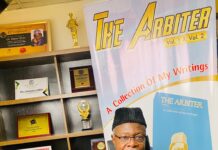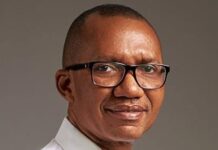What really matters to Obasanjo, by Azu Ishiekwene
The last thing he wants to hear is that he desires anything other than what is good for Nigeria. Hero of Nigeria’s civil war; former military president who supervised the first-post war transition to civilian rule; two-term civilian president; and a much sought-after African leader, Olusegun Obasanjo considers it beneath his status to suggest he can sometimes be wrong about his choices for the country.
He has mastered make-belief uber-patriotism over the years, cultivating this ruse into an art form that disguises his large ego. Yet, it won’t be a bad thing if he had the modesty to admit, even remotely, that Obasanjo, being Obasanjo, his monumental ego often gets the better of him.
After separating church and state, Louis XIV famously looked out the window of his palace in Versailles and declared to himself, “I am the state.” Perhaps for a while, he was. But it was only a matter of time before his vanity led him to collide with the Papacy and protestants, with disastrous consequences.
There’s nothing that the former president covets more than the power to call once and get attention twice. This was what he expected on Monday when, in the middle of the announcement of election results, he issued a statement demanding the cancellation “of all elections that do not pass the credibility and transparency test.”
In one of the nicest public letters, he has written to President Muhammadu Buhari in his many years of epistolatory terrorism, Obasanjo praised Buhari’s effort to ensure a legacy of free and fair elections, but expressed concern that the president’s effort could be harmed by paid officials of the Independent National Electoral Commission (INEC), who were determined to rig the election on the watch of its Chairman, Professor Mahmood Yakubu.
Obasanjo neither provided evidence of the charge nor pretended to have any. He naturally believed that his word, being weightier than proof and more settled than gospel, was sufficient to make Buhari immediately direct INEC to stop further announcements until there is a greenlight from his lair at the Olusegun Obasanjo Presidential Library (OOPL) in Abeokuta.
I’m bereft that the irony of Obasanjo’s demand was lost on him. How the man whose government committed one of the worst electoral heists in Nigeria in 2007 has the audacity to demand stoppage of election results, mid-count, on the grounds of a suspicion, defies belief. But Obasanjo is apparently too fortified and absorbed in a public life of hypocrisy to care much about irony, that quality of existence without which tragedy becomes blatant.
That was why in 2007, it was not Obasanjo who felt ashamed that the general election of that year was massively rigged. Instead, it was the man on whose behalf he rigged the election, Umaru Musa Yar’Adua, who was so deeply concerned about the outcome that he promised to do all he could to be the last elected president to drink from such poisoned chalice.
Neither Obasanjo, who foisted that chalice on Nigeria to avenge his futile bid for a third term after his foot-soldiers spent $500 million to execute his failed plan reported in Too Good to Die, nor Maurice Iwu, the INEC chairman at the time and his accomplice, expressed any regrets about the shambolic outcome of the elections. As you read this piece the result of that election is the only incomplete one on file, 16 years after it was conducted.
Yet Obasanjo, the man whose government supervised that election, does not care that stopping the collation and announcement of election results, mid-count, could plunge the country into the very crisis he claimed he was trying to prevent. There’s even a verified viral audio of him by People’s Gazette in what sounded like a low-budget Donald Trump, stirring up youths to “go and occupy Nigeria” whatever for.
We’ve been here before. Thirty years ago, anti-democratic forces stalled the announcement of the June 12, 1993 election result which MKO Abiola had clearly won and plunged the country into a serious crisis. Obasanjo may not have been a part of the initial plot to abort Abiola’s election; but he was one of its most heartily solicitous beneficiaries.
His audacious demand on Monday gave the eerie feeling that he wanted a replay of June 12, at any cost, if not directly for himself, then for his acolytes.
The conduct of Saturday’s election wasn’t perfect. In his enthusiasm to deliver a flawless exercise, Yakubu over-promised and perhaps mismanaged expectations. Repeating what happened in off-season elections in Edo, Anambra and Osun on a national scale the same day, was always going to be a very tough job.
The late arrival of voting materials in a number of places didn’t help matters. Yet, there is no provision in the electoral law that results not uploaded are invalid. Under Sections 60 (5) and 64 (6) of the Electoral Act, in fact, both the upload and transmission of results are at the discretion of the commission.
If anyone was in doubt about the overall conduct of the elections and the outcome, the final results which kept most guessing, substantially put them to rest. There has been no electoral contest like this in the last 24 years and seven general elections when after only nine months of campaigning a first-time presidential candidate, Labour Party’s Peter Obi, won 12 states across the country, upsetting formidable political strongholds.
It is this same electoral baby that Obasanjo is determined to throw away with the bath water that produced Obi, who won the over six million votes and 25 percent of the votes cast in 16 states, something that in Obasanjo’s heyday as president might only have happened over his dead body.
It was an election in which Atiku Abubakar, a sixth-time presidential candidate and the most experienced of them all, lost not to the bimodal voter verification system or delayed data uploads, but to a self-inflicted injury that cost him five governors and his former running-mate in an election where small margins were always going to matter.
It was an election in which the winner, Bola Ahmed Tinubu, was snagged and sabotaged, but still won in spite of key leaders in his party and vicious government policies designed to bury his ambition. He won in spite of everything and is now compelled by winning with the lowest percentage vote (37 percent) since 1999 to work with other parties to heal the country.
What is Obasanjo afraid of? That Tinubu, after being a two-term governor, would now join the exclusive club of heads of state and presidents of which he considers himself the centre of gravity? I’m not sure.
But it’s not unlikely that after backing the wrong horses in two straight presidential elections, he is concerned that this might be the one that finally retires him; which, quite seriously, will not be a bad thing after all.
INEC’s record on post-election litigation record, a measure of acceptable electoral outcomes, appears to have improved since 2015, significantly reducing incidents of court-awarded victories. It would be interesting to see how this one stands legal scrutiny.
The introduction of the bimodal system and increasing use of technology are entirely INEC-driven ideas to further improve confidence and transparency. It should concern INEC that out of 87 million registered voters about 25 million or only 29 percent cast their votes on Saturday, a new low, even by Nigeria’s standards.
The challenges should, however, not lead to a wholescale trashing of the system and its operators. They should, instead, be properly investigated and malicious infractions punished for the benefit of the system.
Obasanjo’s call to stop and or cancel results and his dire warnings that it is either his way or the highway, was to gratify his ego more than anything else. It’s probably not too late for him to give up trying to be like Mandela or attempting to match the literary talents of Wole Soyinka.
Unfortunately, it’s obvious that at this rate, he’ll have to do more than striving for a Nobel to get even close to the record of these icons. He will need a bit of humility, just a bit. Because, as he must know by now, no man is the state.
Ishiekwene is the Editor-In-Chief of LEADERSHIP.
Follow the Neptune Prime channel on WhatsApp:
Do you have breaking news, interview request, opinion, suggestion, or want your event covered? Email us at neptuneprime2233@gmail.com





